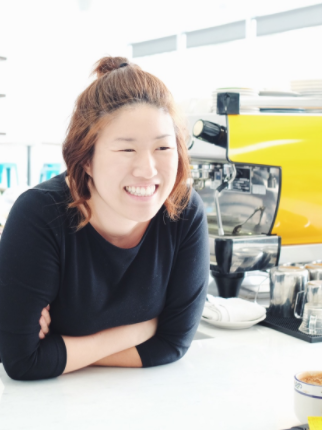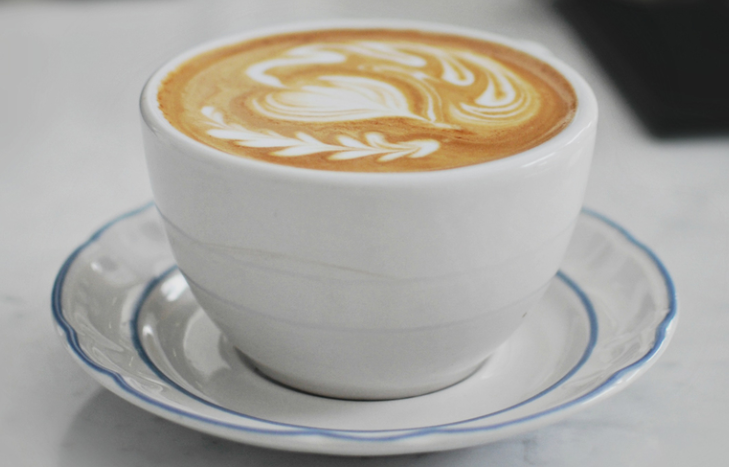Lauren: It’s not just the product they’re getting, but there’s a human behind the coffee and what the human is showing is love behind the coffee. There’s passion.
Annie: It’s the connection.
Lauren: Beautiful. Well, when I was hearing you talk, I was thinking it sounds like coffee is sort of a means to an end - coffee is the means, and the the end being community, human connection or - home.
Annie: I like the way you put that, it’s actually right on the ball.
Lauren: We’ve been reading a psychoanalyst called Robert Stolorow, here at MHT and in his works, he writes about the importance of finding a relational home. He shares about, and I’m liberally paraphrasing here, how mismatched or shattered pieces of our story need to discover a home within relationship - with friends, families, coworkers, communities. How do you feel Found coffee represents a kind of home for mismatched pieces in that way?
Annie: Hm. Well, maybe not mismatched pieces, but the vast array and types of people that you meet in a coffee shop are so different. I think being a coffee shop owner, I get to meet these people, and their stories all add to mine. I love hearing people’s stories and where they’re from and I think behind it all is that everyone struggles, everyone struggles well, everyone has joys, too. And so I tell this to my staff, “if you have a rude customer, give them the benefit of the doubt in the beginning. You don’t know their story, you don’t know if they’re having a bad day.”
The type of people, the network of people I meet, they are the mismatched pieces, and the connection between them all is that they are human. I am so thankful because I get to meet so many different types of people. Something I like to do, on a personal note, is to connect people to each other. So, for instance, we had a guy who was a recruiter at an entertainment studio and I know that my friend has been wanting to animate forever and so I connected the two. And I asked, “Can I do an intro?” And they both were like, “Yeah!”
And then also on the other hand, too, I think coffee shops are a really special place where people who are on the shyer side, I get to bring them out. We have a little bar area and it’s three seats, it’s very close to the barista making the drinks. When I first opened, a girl, I could tell was into coffee, but she didn’t want to talk. And as she came every other day for weeks I got to know her, I slowly got her to talk, and then I realized she wanted to intern at Found. So I interviewed her and she is one of my best now. I told her on the first day, “You need to learn how to need to talk! It’s ok to talk.” And she said, “I know, I know. I’m a little shy.“ And I said, “That’s ok. We’ll find a way for your passion to come through, too.”
Lauren: There are people who have their own unique stories as customers. They feel care in the product, or they feel the care in customer service, they’re understood, there’s a patience there. We’re all human.
When I think about coffee itself, it draws to mind aspects similar to community - it is warm, comforting; it perks you up when you’re having trouble getting through your day; it is rich and flavorful - even to the last drop. What do you consider on a daily basis (from coffee composition to design of your space to interactions with people) that helps Found Coffee consistently feel like home for your customers?
Annie: When people ask me why I call Found Coffee "Found," I have two main reasons, and then a third one. First one is that a lot of things in my shop are Found. They are vintage, upcycled. They have been loved, and they will be loved again. Secondly, I want community to be found, it’sa very big thing for me. In the beginning I had one communal table, now I have two. I’m really eager for people to meet each other and not to be a Laptop City. I love introducing regulars to each other, because then they know the person in their own neighborhood. It’s really great! The third reason why I called Found Coffee “Found” was because I really found who I was in the last 5-6 years, and one of those parts is I found myself in coffee. And I think with all these elements, the communal tables especially, that’s a big part in just providing a space and a place where people are able to find each other in community. It allows for people who haven’t seen each other in a long time to meet. And I think also with the design of the shop, it’s not 30 single tables. I also like to keep it very bright. You see some coffee shops, they’re darker, they’re a little more somber. For me, even the espresso machine is yellow! I think the reason is, you know a lot of Subway restaurants are painted yellow, the walls yellow because it invites people. For me, I took that into consideration for the machine, the main workhorse of my shop, so people feel welcomed, feel invited. And then yeah, it’s just a place where I hope people feel comforted in that everything is close, you don’t feel like you’re stepping on each others’ toes, but also, you have people are nearby.



















